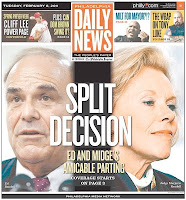
COVERING ORGANIZED CRIME isn't always the most important story of the day, both
George Anastasia and
Dave Schratwieser admitted yesterday. But there's great drama, like a soap opera. Especially in the modern era of the Philadelphia mafia.
"This is the most dysfunctional time in mob history," Anastasia said. "The Philadelphia mob are like
The Simpsons of the underworld."
Anastasia, who graduated from Dartmouth College with a degree in French Literature, has been covering the mafia for the Philadelphia Inquirer for more than 30 years. Schratwieser has specialized in law enforcement and organized crime coverage for most of his career as well, moving from print to television. He's been at Fox29 since 1994.
The two did a weekly segment on the underworld for several years.
It wasn't easy to get good information in the beginning, Anastasia said. He did what most reporters do - talked to cops and defense lawyers. One day, a guy called him and said that his stories were all wrong.
"He was a typical South Philly guy," Anastasia remembered. "He had to get the last word."
So Anastasia developed a relationship with this character, using his information to balance out the sanitized information from officials. This changed everything - all of the sudden, the stories had a life to them, and more people came forward to talk (albeit anonymously), from within law enforcement and the mob.
Both reporters stressed that they never revealed information to either the cops or underworld figures. In fact, on the day one of the Philly mob guys was picked up by cops, Schratwieser received a phone call from the gangster an hour before the arrest. He thought Schratwieser might know about an impending arrest.
Schratwieser said he knew nothing. But he was actually in a Fox29 vehicle around the corner from the guy's house, behind a row of law enforcement vehicles preparing to move in.
"It can be difficult when developing sources," Anastasia said. "These guys think we're friends."
Occasionally, he has meals with mobsters and they try to pick up the tab.
"A lot of these guys have John Gotti Syndrome," Anastasia joked. "They think, 'What's the point of being a gangster if nobody knows?'"
But he declines their offer and pays his own way.
Both reporters have established positive reputations within law enforcement and the underworld for being fair in their stories. Still, former Philadelphia mob boss John Stanfa put a contract out on Anastasia, which Anastasia learned about from the hitman hired to throw grenades through his window.
"They guy told me and said, 'Nothing personal,'" Anastasia remembered.
Here are a few other things that stood out from their visit:
• Schratwieser landed his first journalism job straight out of college because he had been an intern there until he graduated. He got his first job in television, as a producer, after running into a friend in the subway (he was taking broadcast classes while working as a print reporter). He did his first on-air story assignment because six reporters called out sick one day.
• As a general assignment reporter at Fox29, Schratwieser now turns two stories every day, and often re-packages another for the evening news.
• Anastasia used to be able to spend weeks developing stories without actually printing anything. Because of cutbacks, that luxury to develop sources and dig for information is pretty much gone.

• Much of the great information they get is through these sources, some of whom are angry lawyers, mob enemies, proud cops ... people with a particular agenda.
• If you burn a source - in law enforcement or in the underworld - they will never speak to you again.
• Both have new books out. Schratwieser's is
The Hitman; Anastasia's is
The Ultimate Book of Gangster Movies.

They offered this advice for getting a job in journalism:
• Do an internship.
• Go into the field with reporters and photographers. "You're not going to learn remotely what you want to learn by sitting behind a desk at the station," Schratwieser said.
• Don't rely upon the Internet when reporting. Hit the streets.
What stood out for you?






































